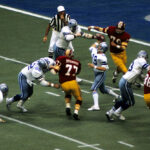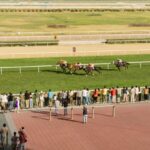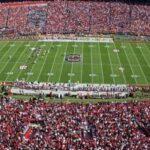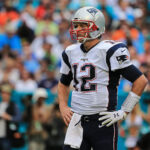Waiting for the Weekend: Inconsistency of Justice
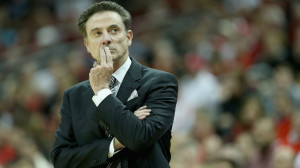
Thee NCAA punishment for Rick Pitino and Louisville is the latest inconsistency in justice from the NCAA.
The Intercollegiate Athletic Association of the United States (IAAUS) was created in 1906 by President Theodore Roosevelt primarily to oversee and make safer intercollegiate football as well as to oversee eligibility in intercollegiate sports. The name of the organization was changed in 1910 to the National Collegiate Athletic Association (NCAA).
Over the last 111 years, this organization has grown to become one of the most hypocritical behemoths within the United States. Though considered a non-profit, the NCAA generates billions of dollars in revenue annually while their primary labor force receives no direct compensation from the association. To make it even worse, those “student-athletes” are penalized by the organization if they dare to attempt to receive anything other than a college scholarship and minimal gifts and awards for participating in tournaments or championship competition.
I could spend thousands of words illustrating examples of the hypocrisy and exploitative nature of the organization, especially when it comes to student-athletes. But, I do not intend to make that the subject of this column.
Instead, I want to briefly explore the announcement this week of penalties against the Louisville Cardinals men’s basketball program and head coach Rick Pitino.
The NCAA is investigating what ineligible players may have appeared in games for the Cardinals from 2010-2014 as part of an alleged sex-for-pay scandal involving a Louisville assistant coach and basketball recruits. If any players were deemed to have performed while they should have been ineligible, then Louisville could be forced to vacate victories, including their 2013 NCAA Championship.
Though he has not been directly implicated, head coach Rick Pitino was suspended by the NCAA for five ACC games next season.
Now, don’t get me wrong, if a Louisville coach was involved in paying women to have sexual relations with basketball recruits, that is morally abysmal and just another example of how some in college athletics have crossed the line. However, much like the Penn State scandal of a few years ago where the university and football administration were without question guilty of failing to meet simple ethical standards, they weren’t necessarily guilty of anything that specifically provided the team with an on-the-field advantage by providing a special benefit or keeping a player eligible.
That lies in very deep contrast to the University of North Carolina, whose men’s basketball team won the NCAA Championship just two months ago. The University and many athletic teams, including the men’s basketball program, have been under the cloud of an academic scandal in which the credibility of an entire department at the college was fabricated for many years, in part to help ensure that student-athletes could remain eligible.
Yet, not only was UNC allowed to participate in the last two national championship games, their head coach, Roy Williams, is regularly lauded by the NCAA and coaches association for his “ethical” behavior.
There is an old saying that the NCAA is so upset with the actions at UNC that they put UNC-Wilmington on probation for ten years. In this case, it almost seems that the NCAA is working with the University to try and make the entire issue go away. It is a stark contrast to how the NCAA handles much less significant scandals at other institutions.
In fact, the NCAA infractions committee has a long and impressive history of inconsistent behavior and picking favorites when penalizing (or not penalizing) schools for various infractions.
Ask fans of the University of Southern California (USC) or Southern Methodist University (SMU) about how punitive the NCAA can be to a program when they choose to be.
In the Louisville situation, the University self-imposed a post-season ban in 2016 that impacted players who weren’t even at the school when the alleged infractions occurred. Unless it is a situation like the potential UNC situation where it is very likely players participating in the game would definitely not have been at the school had there not been for the specific action, I personally am not a fan of vacating victories. However, if you want to punish the university financially, then that is fine.
As for the sanctions on Rick Pitino, they are generally consistent with the recent trend of slapping the wrist of head coaches for actions that occur within the program. Both Jim Boeheim and Larry Brown received similar punishment in recent years. Dating back to earlier this decade when former Ohio State football coach Jim Tressel lied and obstructed an NCAA investigation of his program, but is now the President of Youngstown University, the NCAA and entire system seems to protect long-time members of the system by acknowledging they deserve to be punished, but not doing anything really punitive.
As I said at the very beginning of this column, I could spend weeks writing about all the ways the NCAA has swayed from its original purpose and is now one of the largest conglomerates in the United States. There certainly must be oversight of athletic programs and a vehicle to award championships, but because of the huge money now tied into the system, the NCAA is not impartial and often makes decisions based on the financial bottom line instead of what is fair and just.
My hope is that will someday change, but not holding my breath.
Birthdays: As part of Waiting for the Weekend we recognize some of the greats of sports history born during the week. The week of June 16-22 is filled with some notable births including a couple of the first NFL stars, legendary coaches of both men’s and women’s sports, two of the great quarterbacks of all-time, a women’s tennis legend and two notable sports announcers.
June 16 – Ron Leflore (1948), Roberto Duran (1951), Tree Rollins (1955), Wally Joyner (1962), J.J. Birden (1965), Matt Turk (1968), Phil Mickelson (1970), Kerry Wood (1977)
June 17 – Elroy “Crazylegs” Hirsch (1923), Bobby Bell (1940), Dave Concepcion (1948), Kevin Glover (1963), Dan Jansen (1965), Fred Barnett (1966), Ron “Popeye” Jones (1970), Venus Williams (1980)
June 18 – George Mikan (1924), Lou Brock (1939), Andres Galarraga (1961), Bruce Smith (1963), Kurt Browning (1966), Sandy Alomar (1966), Antonio Gates (1980)
June 19 – Lou Gehrig (1903), Leo Nomellini (1924), Dirk Nowitzki (1978)
June 20 – Doris Hart (1925), Andy Etchebarren (1943), Dickie Thon (1958), Malivai Washington (1969), Rodney Rogers (1971), LaVar Arrington (1978), Darren Sproles (1983), Darko Miličić (1985)
June 21 – Howie Morenz (1902), Eddie Lopat (1918), Mike McCormack (1930), Rick Sutcliffe (1956), Tom Chambers (1959), Mike Sherrard (1963), Robert Drummond (1967), Richard Jefferson (1980)
June 22 –Carl Hubbell (1903), “Pistol” Pete Maravich (1947), Clyde Drexler (1962), Eric Green (1967), Kurt Warner (1971), Cory Alexander (1973), Dan Wheldon (1978), Ian Kinsler (1982)
